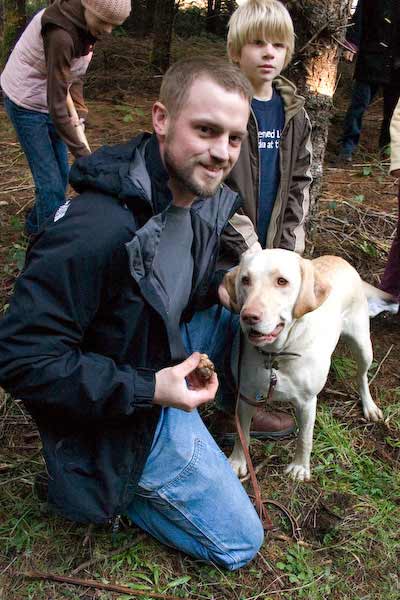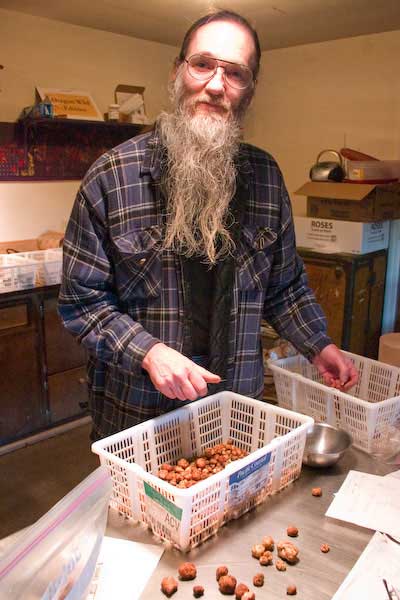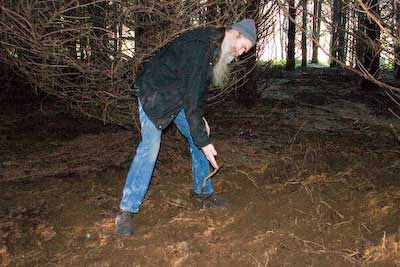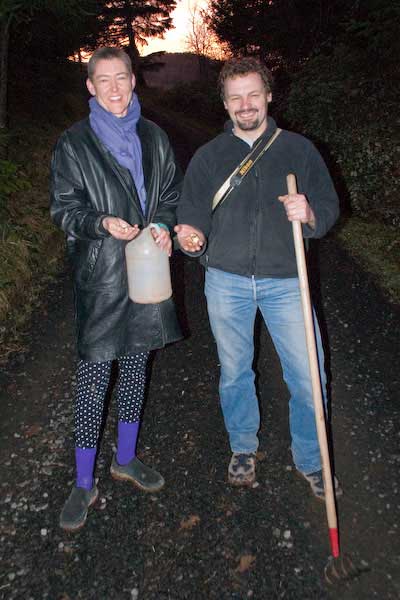As soon as I'd finished my keynote presentation, I relaxed and started to really enjoy the Oregon Truffle Festival. Talking to a room full of people and trying to keep their interest is a challenge at the best of times - to do it while talking about truffles doubly so. Mind you, I am known for volubility on the subject, and for the possession of definite opinions, so perhaps I have a slight advantage. As it was, I ran out of time long before I ran out of things to say - which will come as little surprise to my family. Fortunately, the things I said found favour with disparate sections of the audience - from the truffle gatherers of the Oregon woods, to the new truffle growers of the USA - even one imposing truffle importer (all 7ft and 250lbs of him). I talked about dogs mostly, and Peg was the star. Dogs are important to truffle growers because they are the first stage of quality control. And they need QC in Oregon, where the native truffles are harvested with rakes.

I predict this dog - Stella - will be the USA's first national truffle dog champion. Seen here with her owner, Aaron Kennel at the Festival foray at Shirewood Farm (where you can try your own hand at truffle hunting), she had just flown back from Tennessee where she'd found 9lbs of Perigord black truffle at a young plantation. A talented animal - and a keen owner with his own black truffle plantation coming along nicely.
I was inducted into the mysteries of Oregon truffles by Jim Wells, a man who is virtually single-handedly trying to impose quality control on truffles harvested by rakes. Bags of truffles arrive and Jim sorts them into grades. Some he can sell straight away, others can be matured for a while in paper bags in the fridge to develop full flavours - but only if they're showing signs of ripeness. Many are infants ripped from the womb, and will never mature.

This is Jim, grading white truffles in advance of the Festival. He's not quite as imposing as Todd Spanier, the truffle importer, but waking between the two after the keynote I felt a lot like a hobbit in the company of men. Though my feet aren't hairy.

Jim also took me out to what used to be the most productive truffle forest in the state - called Kitty's Place. News of the good hauls to be had here spread through the rakers, and it has now been devastated by hyperactive harvestersr - probably speeding on copious quantities of crystal meth. Roots are ripped up and left bare, the soil left in loose piles. And they wonder why yields are dropping. If it's not criminal, it ought to be. A classic example of the tragedy of the commons - he who rakes first takes all, even if it's not ripe and ruins next year's harvest.
Harvesting with dogs is the answer, but how to transition the business to harvesting that way is a question impossible to answer. Meanwhile, Jim imposes his own quality standards. He sells Oregon truffles for twice the price that anyone else gets, and has customers queuing up for more.
The Festival itself was a great mixture of fine food and interesting events. I managed to eat Oregon white and black truffles, my first ever bianchetto (fantastic - I want my trees to produce today), Perigord black truffles, and to have a sniff of an incredibly rare Choiromyces species. I learned how to rake for Oregon truffles...

Lorraine and Charlie show off the spoils
...met the matsutake king of the Pacific Northwest, had a fantastic prawn pathia at what is without doubt the world's only Greek Indian restaurant, and sold all the books I had with me in the first 45 minutes of Sunday's marketplace. My thanks to Charlie and Leslie and the organisers and volunteers who made the festival weekend so memorable. I look forward to returning, and eating much more truffle.
.jpg)


